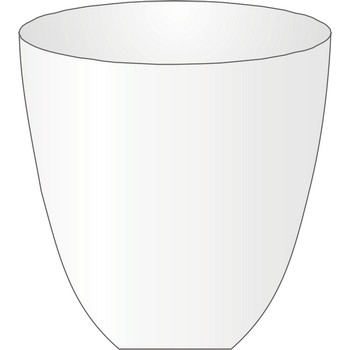natural resins → prirodne smole
Natural resins are organic compounds which are secreted by some plants and insects. They are used as adhesives, and are very often unsoluble in water.
nautical mile → morska milja
Nautical mile is a legal international unit of length temporarily maintained with the SI. It is still used in navigation (merchant marine, aviation). It is equal to the length of an arc of one minute measured at a latitude of N 45° (mile = 1852 m). The international nautical mile has been taken equal to the nautical mile.
crucible → lončić za žarenje
Crucible is used for heating small amounts of solid in an oven to very high temperatures. Crucibles are usually made out of porcelain, platinum, nickel or iron.
cryogenic fluid → kriogenski fluid
Cryogenic fluids are used for accessing low temperatures, usually below -150 °C. Cryogenic temperatures are achieved by the rapid evaporation of volatile liquids. The most common laboratory cryogenic fluids are liquid nitrogen (-196 °C). Nitrogen gas is colorless and odorless. The cloud formed when pouring liquid nitrogen is condensed water vapour from the air, not nitrogen gas.
cryogenic fractionation → kriogena frakcinacija
Cryogenic fractionation is a process of separation of gases by cooling them until they enter their liquid state. Large scale gas production companies use this method to produce liquid oxygen, liquid nitrogen etc. Gases have different boiling points (the temperature at which they change from liquid to gas). Oxygen has a boiling point of -183 °C, and nitrogen a boiling point of -195.8 °C. Therefore by cooling the gas mixture to -183 °C, the oxygen can be collected as liquid and the nitrogen remains its gaseous form.
cyclic voltammetry → ciklička voltametrija
Cyclic voltammetry (CV) is an electrochemical measuring technique used for the determination of the kinetics and mechanism of electrode reactions. The potential of the working electrode is controlled (typically with a potentiostat) and the current flowing through the electrode is measured. It is a linear-weep voltammetry with the scan continued in the reverse direction at the end of the first scan. This cycle can be repeated a number of times, and is used for corrosion studies.
nominal → nominalno
Nominal is used to describe a process where 100 % accuracy is not guaranteed. For example, sand filtres are usually sold to filtre to a nominal 10 μm, which means that they will filtre most particles of 10 μm and larger, but not all. A filtre which is guaranteed to filtre all particles of 10 μm would be termed absolute rather than nominal.
non-soap cleanser → nesapunsko sredstvo za čišćenje
Non-soap cleansers (detergents) are synthetically produced from byproducts of oil refining and are used in the production of washing powder, shampoos and hair conditioners.
Citing this page:
Generalic, Eni. "Zemljina kora." Croatian-English Chemistry Dictionary & Glossary. 29 June 2022. KTF-Split. {Date of access}. <https://glossary.periodni.com>.
Glossary
Periodic Table

